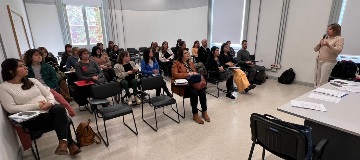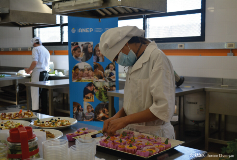School Food

Uruguay has operated a school meal programme (PAE) since 1920, providing meals to students in pre-primary, primary and secondary education (Liceos y Universidades del Trabajo del Uruguay). The programme is coordinated by the Directorate General of Early Childhood and Primary Education (DGEIP), an entity dependent on the National Public Education Administration , which serves approximately 260 000 public school students. Since 2003, the country has also implemented a school milk programme, distributing iron-fortified powdered milk and fluid milk to all schools nationwide. Currently, the school meal programme offers universal coverage and is subsidized through a national primary tax, enabling the service to be provided in three different modalities:
- Traditional modality: Meals are prepared at school, with all food and supply purchases made by school staff (except for powdered milk, which is purchased by the central government). By 2024, 1 928 schools will be using this modality.
- Outsourced transportation modality: Meals are prepared in food processing plants and then transported to schools. This modality is used when schools lack the infrastructure or specific personnel to carry out these tasks. By 2024, 94 schools will adopt this modality.
- Outsourced “cooking at school” modality: Meals are prepared at school by external personnel. By 2024, 97 schools will implement this modality.
Depending on the amount of time a student spends at school, they are provided with different meal times:
- Extended teaching time: Students and school staff with extended teaching hours (more than 4 teaching hours) receive three meals: breakfast, lunch and a snack. Currently, approximately 500 schools offer this three-meal service.
- Morning sessions: Approximately 1 017 rural schools with morning sessions (from 10 a.m. to 1 p.m.) provide lunch.
Approximately 500 schools with morning (10 a.m. to 1 p.m.) or afternoon (1 p.m. to 5 p.m.) shifts provide lunch and snacks. In 2013, Law 19 140 (healthy eating in schools) was published, was enacted to prevent and reduce overweight and obesity in schoolchildren by promoting healthy eating habits and prioritizing minimally processed natural foods. The enactment of this law, along with the publication of the Uruguayan food guide in 2015, has established a legal framework for the nutritional guidelines of the school meal programme. This framework includes incorporating nutritionally adequate foods and beverages into cafeterias and educational institutions, as well as the mandate that water be served as the primary drink at meals.
The school meal programme’s technical team, consisting of 32 nutritionists, is responsible for creating a series of recipe books that implement these recommendations to assist the cooking staff in planning and preparing menus. All modalities must comply with these recipe books. The latest versions are:
- Recipe book: The delights of my school (2024), which includes recipes for breakfast and snacks.
- Annual Cookbook: New Flavors of My School (2021), which includes recipes for lunch.
The main characteristics of these recipe books are:
| Users of the recipe books |
|
| School meals covered | School meals |
| Recipes based on: | Food groups and frequency of consumption |
| Food groups covered |
|
Recipe book development process
The recipe books for preparing menus are developed based on the guidelines outlined in the Dietary Guidelines for the Uruguayan population, the consumption habits and tastes of schoolchildren, and the guidelines of Law No. 19 140. Given the recent update and publication of these recipe books, no future revisions are planned, except for adjustments to add or remove recipes according to acceptability levels in schools.
Implementation of recipe books
Each school is assigned a nutritionist from the school meal programme who is responsible for providing annual training to the cooking staff on food safety and proper menu preparation.
Additionally, the cooking staff have access to resources and tools developed by the DGEIP to enhance the implementation of the programme, such as:
- General guidelines for breakfast and snack services
- General guidelines for food services
- Cleaning plan
- Disinfection protocol
- Holiday menu recommendations
- General guidelines for food services (summer schools)
- Summer Schools 2024 Cookbook
- Holiday Menu Recommendations
The DGEIP encourages schools to provide fruit to students during recess.
Monitoring adherence to the recipe books and evaluation of the programme
Nutritionists from the school meal programme are responsible for monitoring it through school visits. During these visits, they observe several aspects, including:
- Food hygiene and handling practices;
- Personal hygiene, cleanliness of spaces and equipment;
- Adherence to recipe books (including recipes prepared, ingredient quantity and quality, and portion sizes);
- Organoleptic characteristics of the prepared menu;
- Service execution and commensality;
- Portion control relative to the number of diners; and
- Management of items allocated to the food service.
In 2019, an evaluation of the school meal programme and monitoring of the nutritional status of schoolchildren in public and private schools in Uruguay was carried out. The aim was to assess the programme by students and teachers. One recommendation from this evaluation was to create new recipe books aligned with the updated national dietary guidelines.
In Uruguay, the sale of any other type of food not included in the school meal programme is prohibited, which is why schools do not have cafeterias, kiosks, or tuck shops in schools. However, there is currently no policy or regulation to control what is sold on the school premises.
Relevant Links
Articles

FAO Uruguay y Dirección de Educación Inicial y Primaria dialogan sobre su participación en la RAES
02/10/2023
La Organización de las Naciones Unidas para la Alimentación y la Agricultura en Uruguay y la Dirección de Educación Inicial y Primaria (ANEP) del país, quien coordina el programa de alimentación escolar (PAE) local, realizaron un diálogo híbrido sobre su participación en la Red de Aliment...

Los primeros pasos de la metodología Escuelas Sostenibles en Uruguay
03/05/2024
La metodología Escuelas Sostenibles fue creada por la Cooperación Internacional Brasil-FAO. Busca generar experiencias prácticas y evidenciar los desafíos y las potencialidades de cada país, con miras a escalonar estas experiencias a la política de alimentación escolar. Al momento hay ...
